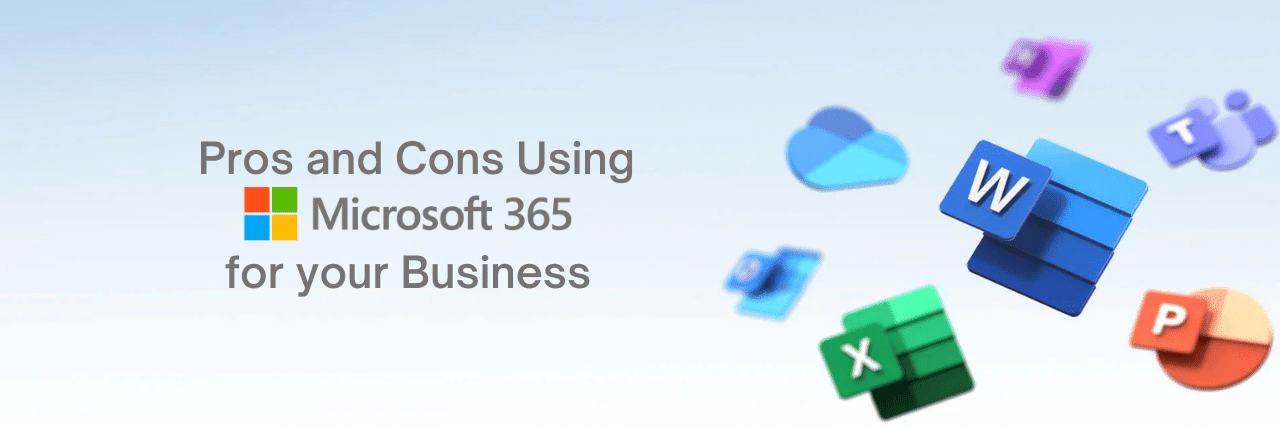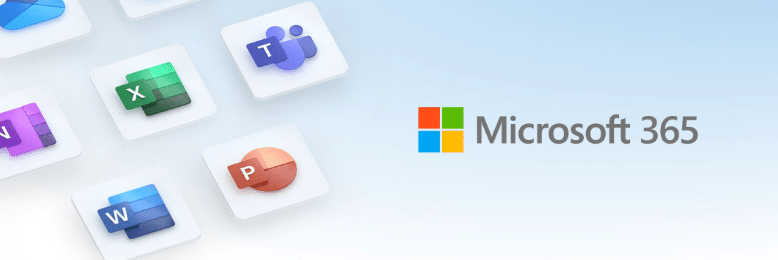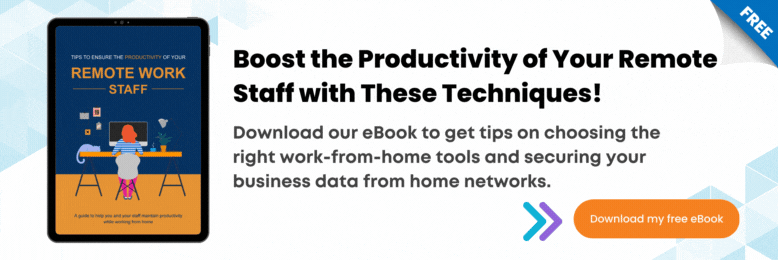Pros and Cons of Using Microsoft 365 Suite for Your Business
February 23rd, 2022 | 4 min. read

Whether your office requires people to show up to your headquarters every day or work remotely, effective communication and data management is essential to keep everyone in the loop.
Microsoft 365 can help you with that.
As the preferred Cloud-based suite for businesses, Microsoft 365 has a complete line of apps that boosts workers’ productivity whenever or wherever they may be. They could be WFB (working from the beach) and still be able to stay on top of the waters and the workflow.
You get what we mean.
Here at ITS, we help businesses thrive by setting up relevant tools for seamless operations. Hence, in this article, you will learn more about how using Microsoft 365 gets the job done no matter your current work setup. Following are the key points to be discussed:
- Introduction to Microsoft 365
- Pros and Cons of Using Microsoft 365 in Your Business
Introduction to Microsoft 365 Suite
 Microsoft 365 was first introduced in 2017 as an upgraded version of Office 365. In case you’re confused, Microsoft 365 combines the same features and benefits that users love in the previous version but with a different, more reflective name.
Microsoft 365 was first introduced in 2017 as an upgraded version of Office 365. In case you’re confused, Microsoft 365 combines the same features and benefits that users love in the previous version but with a different, more reflective name.
It has all the essential Microsoft tools from Word to Outlook and other helpful apps that provide intelligent cloud services, data management, and advanced security system in one, connected experience–but with the addition of two special products:
- Windows 10 licenses
- Enterprise Mobility + Security (EMS) tools, the main function is to help keep your business and your customers’ data safe.
There are three categories under Microsoft 365: Home, Business, and Enterprise. We will run through each one in sum.
Microsoft 365 Home, as indicated in the name, is a plan that is helpful for personal use at home or for sharing with family members.
Microsoft 365 Business is a plan focused on small and medium-sized business deployments (up to 300 employees) since it has a limited number of users offered.
Microsoft 365 Enterprise, on the other hand, is a plan that targets larger-sized businesses wherein the number of users allowed is unlimited.
The Pros and Cons of Using Microsoft 365 in Your Business
Should you migrate to Microsoft 365? We listed down the pros and cons of using one to help you make a decision.
Microsoft 365 Pros
 Accessibility
Accessibility
Probably the selling point of Microsoft 365, it gives users unlimited and unrestricted access to the Cloud storage from literally anywhere as long as there’s an internet connection. This allows users to connect and collaborate with teammates or managers, even though they are not working on site.
 Enhanced Work Efficiency
Enhanced Work Efficiency
Another upside of using Microsoft 365 is the seamless workflow management. With the Co-Authoring tool offered by Microsoft 365, multiple users can collaborate on a project simultaneously, allowing them to keep track of the changes and the exact time a change has been made, without overlapping or duplicating the copies.
This saves you and your team ample time to do other tasks since there’s no need to wait for someone to finish their part before the other one takes over.
In addition to that, Microsoft 365 has its own dedicated IT support that ensures your software is up-to-date and running 24/7 to not slow you down from achieving your work goals.
 Security
Security
As technology progresses, so do cyber-attacks. And having all your files in one centralized system may raise such security concerns. You don’t have to worry about it.
Microsoft 365’s Zero Trust security runs through all available plans. This strategy includes four critical safety features below:
- Microsoft Identity and Access Management (IAM) solutions, allow your IT team to manage digital identities, thereby enabling secure access to your company’s resources such as applications, networks, and databases.
- Microsoft Advanced Threat Protection (ATP) includes integrated, automated security solutions that help secure your email, data, applications, devices, and identities against cyber threats.
- Microsoft Information Protection (MIP), helps you locate, organize and protect your company’s sensitive information across clouds, apps, and endpoints. MIP capabilities and solutions help you know your data, protect your sensitive information and prevent data loss.
- Microsoft 365 Security and Risk Management, which helps you quickly identify and remediate risks from both malicious and unintentional activities to protect your company’s critical information.
Microsoft 365 Cons
 Internet-Dependent
Internet-Dependent
If there’s one major disadvantage to using Microsoft 365, it would be internet dependence.
Since Microsoft 365 is a Cloud-based suite, it needs a stable internet connection to work. Although Microsoft has already developed a built-in desktop version to cover this, wherein users can access previously uploaded files and then sync changes once the connection is restored, chances for disarrayed and overlapping file modifications are high since the edits will not reflect in real-time.
 Compatibility
Compatibility
There would be instances where a user’s operating system will not be compatible with Microsoft 365. This is because Microsoft requires the newest and most up-to-date software. That being the case, suppose the user’s old system is outdated; it will not be able to support the complexity of Microsoft.
During these situations, the user can either upgrade to the newest version of Microsoft Windows or discard the old system and obtain a new one. Both options require time, energy, and money.
There is a third option that doesn’t require you to shell out money. Office Online, a tool that allows you to view and edit documents without having to subscribe to a plan, can be your last resort. However, this tool does not have previously mentioned distinctive features and is not recommended for remote or hybrid work setups.
 Security Glitches
Security Glitches
Microsoft runs a very secure system, however, correct configuration and setting up network security for optimal performance may be a challenging task when done on your own.
You may try running a reliable firewall, creating strong account passwords, or enabling multi-factor authentication (MFA) of your choice. Alternatively, you can hire a Managed Service Provider (MSP) to set up and configure the network for you.
Is Microsoft 365 the Right Fit for Your Business?
Microsoft offers a wide variety of plans tailored to fit your business. Some allow you to customize the use of apps, and others even go to great lengths of giving you the power to manage your files under your own steam.
In our experience at ITS, Microsoft 365 has helped us regulate workflows and manage files efficiently with no security risks to worry about. However, the choice is still yours to make.
To help you decide, you may want to talk to an expert for a free technology assessment today.
Jess is a Content Writer who commits herself to creating helpful, relevant, and easy-to-digest technical articles. When she isn't writing, she devotes her energy (and money) to collecting K-Pop photo cards, which she likes to call an 'investment.'
Topics:
